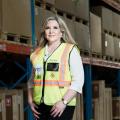With over 130 million containers packed with various types of cargoes shipped around the world annually, the process of shipment of hazardous cargo remains an integral part of global trade.
The recent decision of the New York District court in the case of the MSC FLAMINIA has highlighted yet again the importance of the proper declaration, handling and stowage of dangerous cargo (and no doubt to those involved how expensive the exercise of litigation can be!).
Local online publication Africa Ports & Ships has reported that MSC has decided to introduce a smart tracking device to 50 000 of its dry cargo containers. The introduction of the smart technology is reported to transform the container into a “smart, connected object which collects and communicates real-time data on its position and movements throughout its journey”. Pertinent to the MSC FLAMINIA disaster, the device is said to assist in keeping the cargo secure by providing all interested parties with real time data as to a cargo’s temperature, humidity level, exposure to shocks and vibrations, as well as door opening and closing.
It is further anticipated that the technology afforded by such smart devices (which has been developed by MSC’s partner, TRAXENS) will also in due course facilitate easier and quicker pre-customs clearance.
Whilst the device is restricted to dry cargo containers, it does reflect the potential which smart technology can have in detecting and preventing a reoccurrence of the events leading up to the explosion of the cargo of DiVinylBenzene (DVB) on board the MSC FLAMINIA.
It further illustrates how successful implementation of Industry 4.0 advances can streamline the logistics of moving a container from point A to point B, and in so doing enhance supply chain management for shippers and receivers by improving efficiency, safety and predictability. The CEO of the MSC Group has indicated that he believes that real-time tracking of containers is the future of the shipping industry. Maersk and IBM’s Tradelens have similarly recognised the advantages to be gained in adopting blockchain technology to improve information and visibility throughout the supply chain.
Whilst there are no doubt cost implications in implementation of such smart technologies, it is hoped that the industry will remain cognisant of the advantages to be gained, which may ultimately render a company not only technologically savvy and ‘smart’, but also financially competitive, and able to avoid, or at the very least minimise, the costly exercise of litigation.









